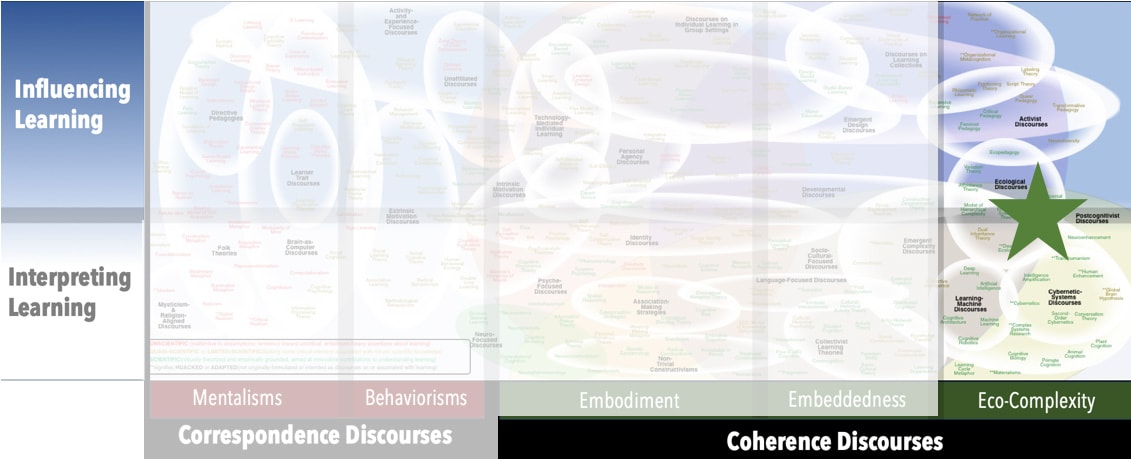AKA
Ecophilosophy
Ecosophy
Focus
Systemic well-being across levels of organizationPrincipal Metaphors
- Knowledge is … sum of the dynamics that contribute to systemic self-maintenance
- Knowing is … systemic well-being; living
- Learner is … any level/domain of complex, dynamic human activity
- Learning is … adaptations (to maintain fitness with grander ecosystem)
- Teaching is … co-adaptation
Originated
1980sSynopsis
Rejecting assumptions of human privilege, superiority, and distinctiveness, Deep Ecology asserts that the survival of any part of Earth’s ecosystem is dependent on the well-being of the whole. The theory is aimed at rethinking human societies in ways that not only curtail human-triggered degradations to the more-than-human world, but that involve fundamental reformattings of human sensibilities that are attentive to deep relationships and interconnections among all living things. Deep Ecology seeks to ground all human activity in an ethical system that decenters human interests and recognizes that all forms of life have value in themselves, independent of human purposes. Associated discourses include:- Animalism – the principle that humans are animals – typically asserted against (and as a means to sidestep) the backdrop on assumptions or debates on the distinct nature of humans (i.e., material vs. immaterial, rational vs. irrational, conscious vs. nonconscious, etc.)
- Deep Adaptation (Jem Bendell, 2010s) – a speculative theory that assumes abrupt and catastrophic environmental transformations are imminent, thus attending more to post-collapse response than pre-collapse mitigation
- Ethnobiology – the scientific study of historical and current relationships between humans and nonhuman lifeforms. Subdisciplines include:
- Ethnobotany – the scientific study of historical and current relationships between human societies and plants, including the roles of plants for food, as medicines, and in rituals.
- Ethnoecology – the scientific study of the ways that humans understand, interact, and utilize ecosystems, historically and currently
- Ethnozoology (Anthrozoology; Human–Nonhuman-Animal Studies) – the scientific study of historical and current relationships between humans and nonhuman animals, including across such activities as hunting, domestication, rituals, and classification
- Biophilia (Erich Fromm, 1960s) – translated from the Greek for “love of life,” a natural affinity (or “psychological orientation”) to vibrant, living systems.
- Biophilia Hypothesis (Edward O. Wilson, 1980s) – the assertion that Biophilia is rooted in human biology – that is, it is a product of evolution. In education, the Biophilia Hypothesis is commonly invoked as a necessary consideration in discourses associated with Systemic Sustainability Education.
- Dragon Dreaming (John Croft, 1980s) – a framework designed to foster personal growth, community building, and ecological consciousness. Its four-step process (Dreaming, Planning, Doing, Celebrating) draws on Complex Systems Research, Deep Ecology, and Indigenous Australian wisdom.
- Earth Education (Tom Anderson, Anniina Suominen Guyas, 2010s) – an educational emphasis rooted in Deep Ecology that focuses on the arts and that is intended to promote awareness of the profound interconnectedness of being.
- Interbeing (Thich Nhat Hanh, 1980s) – a notion rooted in Buddhism that is associated with mindful awareness that all objects, acts, and events are interconnected
Commentary
Deep Ecology is prominently criticized as a globalist ideology masquerading as a scientific theory. In this regard, it is especially criticized for asserting “equal rights” to all species – a notion, some argue, that only makes sense in relation to unstated interests and obligations. In other words, some critics charge Deep Ecology with simplistically and problematically imposing human systems of value and interpretation onto non-humans. (Note, the point is not that the underlying motivation is misguided, it’s that the approach is inappropriate. There may be great peril in framing ecological justice as an expanded version of social justice.)Authors and/or Prominent Influences
Henry David Thoreau; Rachel Carson; John Muir; Wendell Berry; Arne Næss; Félix GuattariStatus as a Theory of Learning
Deep Ecology interprets the planet’s dynamics in terms of nested, dynamic, and co-entangled systems – all of them engaged in an endless dance of co-adaptation. Phrased differently, all living systems can be understood as learning systems. Like Complex Systems Research and Universal Darwinism, then, Deep Ecology can be properly interpreted as a trans-systemic theory of learning.Status as a Theory of Teaching
Deep Ecology is not a theory of teaching. However, educational philosophies have emerged that draw on the theory. (See, e.g., Ecopedagogy.)Status as a Scientific Theory
Deep Ecology is founded on empirical research in Complex Systems Research and from the scientific field of ecology. It is also informed by compatible interpretations and recommendations from grass-root social movements around the planet, involving peoples with diverse situations and worldviews.Subdiscourses:
- Animalism
- Biophilia
- Biophilia Hypothesis
- Deep Adaptation
- Dragon Dreaming
- Earth Education
- Ethnobiology
- Ethnobotany
- Ethnoecology
- Ethnozoology (Anthrozoology; Human–Nonhuman-Animal Studies)
- Interbeing
Map Location

Please cite this article as:
Davis, B., & Francis, K. (2025). “Deep Ecology” in Discourses on Learning in Education. https://learningdiscourses.com.
⇦ Back to Map
⇦ Back to List
